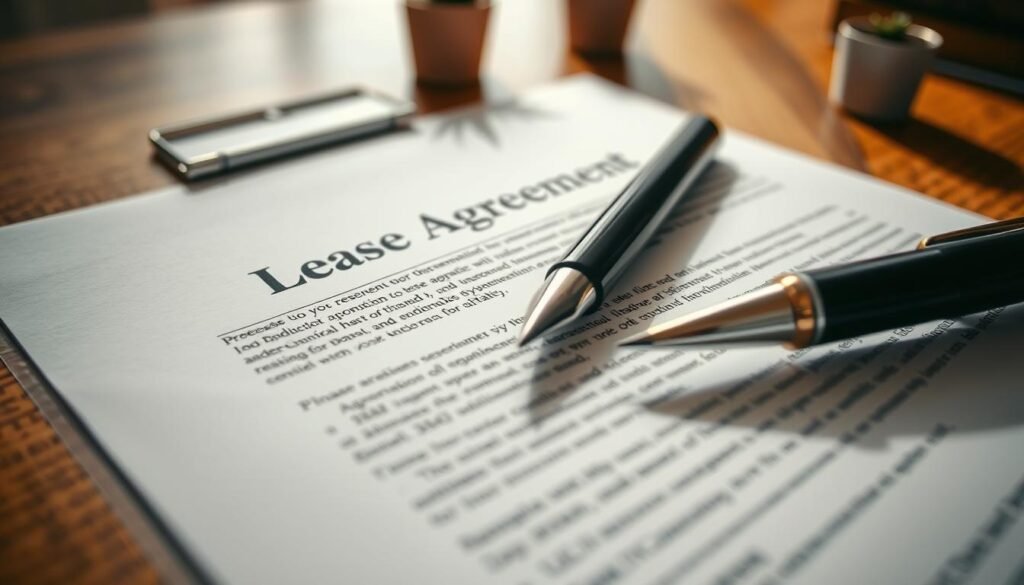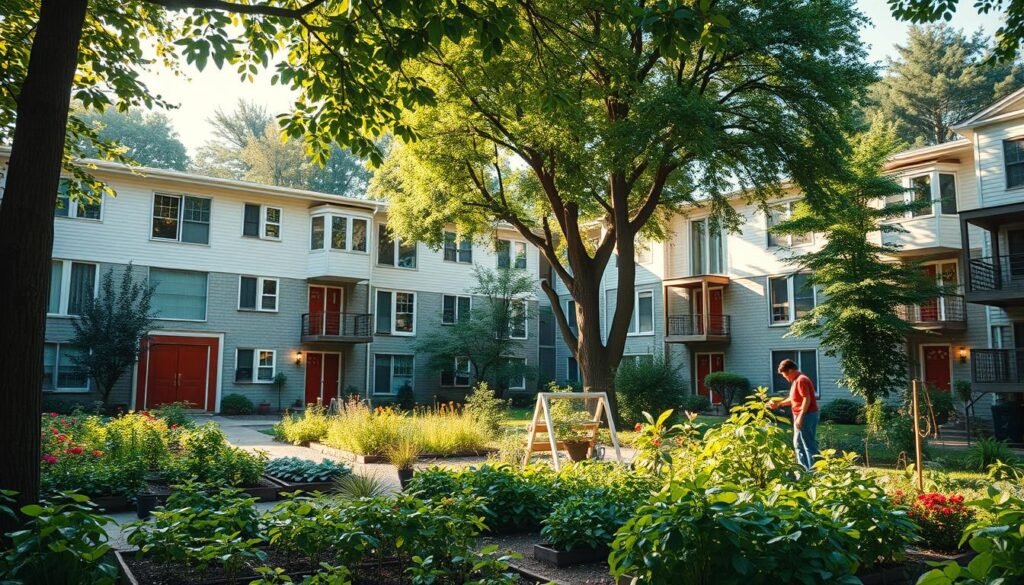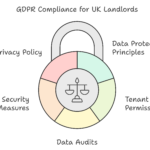In today’s fast-changing rental market, the bond between tenants and landlords is key. But did you know this bond can make your rental experience both harmonious and profitable? Let’s uncover the secrets to building lasting, positive connections that benefit everyone.
Are you ready to learn the secrets of successful tenant-landlord relationships? Join us as we dive into the essential strategies, communication tips, and legal aspects. These will help you create a thriving rental environment.
Key Takeaways
- Understand the importance of positive tenant-landlord relationships and their impact on tenancy retention.
- Establish effective communication strategies to foster transparency and trust.
- Set clear expectations and responsibilities to maintain a harmonious rental experience.
- Implement responsive maintenance practices to demonstrate your commitment to tenant satisfaction.
- Learn how to handle conflicts gracefully and build long-term relationships with good tenants.
Understanding the Importance of Tenant-Landlord Relationships
Good relationships between tenants and landlords are key to successful property management. These connections affect daily interactions and can influence tenant retention, legal issues, and property condition.
Why Relationships Matter
Tenants who get along well with their landlords tend to take better care of the property. This means less damage and possibly a higher property value. Happy relationships often lead to longer tenancies, which is good for landlords’ income.
Good communication and respect between landlords and tenants help solve problems quickly and fairly.
Impact on Tenant Retention
Landlords with good relationships with tenants are seen in a better light. This can lead to more referrals and positive reviews, helping to attract new tenants. However, ignoring tenancy agreement terms or late payments can damage the relationship and lead to disputes.
Legal Implications of Poor Relationships
Regular checks and maintenance help keep the property in good shape and address problems early. Using technology like the Azibo platform can make communication and management easier. This can lead to better interactions between landlords and tenants.
By understanding and respecting each other’s Tenant Rights and Landlord Responsibilities, both can follow Rental Property Laws well and avoid legal trouble.
| Benefit of Positive Relationships | Impact on Landlords | Impact on Tenants |
|---|---|---|
| Increased tenant retention | Stable rental income | Longer tenancies |
| Improved property condition | Preserved property value | Respect for the rental property |
| Efficient conflict resolution | Reduced legal disputes | Satisfaction with landlord’s responses |
| Enhanced reputation and referrals | Easier tenant recruitment | Positive word-of-mouth |
Effective Communication Strategies
Good communication is key to a strong tenant-landlord bond. Landlords should give clear contact details and reliable ways to talk. This makes tenants feel valued and supported.
Using tech like property management software helps landlords talk to tenants fast. They can answer questions quickly and keep the conversation going.
Open Lines of Communication
Landlords should reply to tenant questions fast. Aim for under 20 minutes, but 24 to 48 hours is okay. Three Pentacles, PLLC uses tech to handle payments and maintenance requests.
They send and receive updates right away. It’s best to answer tenant calls quickly or within 20 minutes if you can’t.
Utilising Technology for Communication
Clear and simple talk is crucial for understanding between landlords and tenants. Tech like online portals and texts makes talking easier. Keeping records of talks is also important.
Importance of Active Listening
Listening well is a big part of good communication. Being kind and understanding helps landlords solve problems fast. This builds trust.
But, there can be barriers like language or tech issues. Personality clashes or emotional problems can also get in the way. Good communication is the base for a strong landlord-tenant relationship.
Setting Clear Expectations
It’s key to set clear expectations right from the start for a good Tenancy Agreements between landlords and tenants. This means defining who does what, setting house rules, and having a detailed written agreement. This agreement should cover everything about the tenancy.
Defining Roles and Responsibilities
The tenancy agreement should clearly state what each side is responsible for. This includes who does repairs, gardening, and cleaning. Being clear about these roles helps avoid confusion and makes the tenancy smoother for everyone.
Establishing House Rules
Setting house rules is also crucial. These rules might cover things like noise levels, guest policies, pet rules, and what you can and can’t do in the property. Being open about these rules helps create a respectful and peaceful living space.
Importance of a Written Agreement
A detailed written agreement, like a lease contract, is vital. It outlines the tenancy terms, including rent, deposits, and what each side is expected to do. This agreement protects both the landlord and the tenant’s rights and responsibilities.
| Aspect | Landlord Responsibilities | Tenant Responsibilities |
|---|---|---|
| Maintenance | Repairs to the structure and major appliances | Maintaining cleanliness and reporting issues promptly |
| Rent Payment | Providing a clear rent schedule and payment methods | Paying rent on time and in full |
| Property Use | Establishing reasonable house rules | Adhering to the property’s rules and regulations |
By setting clear expectations, landlords and tenants can build trust and understanding. This is key for a positive and lasting relationship.

Responsive Maintenance Practices
Keeping a property in top shape is key for good tenant-landlord relations. Landlords who fix things quickly show they care about their tenants and the property’s value. Quick repairs solve problems and keep tenants happy, boosting the property’s worth.
Timely Repairs and Their Impact
Quick action on maintenance requests shows a landlord is responsible. Tenants want their issues fixed fast, like a leaky tap or broken heating. Fast repairs stop small problems from getting bigger and more expensive.
Happy tenants are more likely to stay and recommend the place. This strengthens the bond between them and the landlord.
Creating a Request System
- Set up easy ways for tenants to ask for maintenance, like an online form or a special phone number.
- Use a system to keep track of maintenance requests. This ensures you follow up and solve problems quickly.
- Keep tenants updated on their requests. This shows you’re listening and working on their issues.
Regular Property Inspections
Regular checks on the property help spot problems early. Landlords should look over the property, with or without tenants, to see how it’s doing. This keeps the property in good shape and shows you’re serious about providing a great place to live.
| Metric | Percentage |
|---|---|
| Property managers prioritising responsive tenant services | 85% |
| Property managers conducting regular property inspections | 72% |
| Tenants satisfied with their landlord’s maintenance practices | 78% |
Handling Conflicts Gracefully
Conflicts are a normal part of any tenant-landlord relationship. It’s important to handle them with care and professionalism. Knowing the common issues like maintenance, rent, and noise complaints is the first step.
Strategies for Conflict Resolution
When conflicts happen, the right communication is key. Listening actively, finding solutions that work for both, and staying respectful are important. Landlords should respond to tenant queries within 24 hours to show they care.
Mediation When Necessary
For complex issues, professional mediation can help. A neutral third party can guide the parties to a fair solution. This avoids the cost of legal action.
Keeping detailed records of all tenant communications is crucial. It protects both parties and shows a clear history of interactions. Handling conflicts well helps build strong relationships with tenants. This leads to higher retention rates and a more profitable business.
Building Trust Through Transparency
Transparency is key in Building Positive Tenant-Landlord Relationships. Sharing details about the property, like maintenance plans or ownership changes, makes tenants feel important and in the loop. Being open about Rent Management is also vital for trust. Being honest, even when sharing tough news, builds a respectful and trustworthy bond between both sides.
Sharing Important Information
Keeping tenants updated on the property’s state and any future changes can prevent misunderstandings and fights. This approach helps build trust and teamwork, leading to better interactions and fewer disagreements.
Financial Transparency
Being clear about rent, deposits, and extra fees boosts tenant happiness. When everyone knows what to expect, the rental process is smoother, saving time and stress. Being open about rent changes shows fairness and responsibility.
The Role of Honesty
- Building trust right from the start is key for a good Building Positive Tenant-Landlord Relationships.
- Clear and consistent talk is vital for successful Rent Management.
- Quickly fixing maintenance issues shows a landlord’s dedication to comfort.
- Smart landlords know the law to protect tenant rights and keep things professional.
By focusing on transparency and honesty, landlords can create lasting, positive relationships. This leads to a peaceful living space for everyone.
| Benefit | Impact |
|---|---|
| Reduction in misunderstandings and conflicts | Smoother interactions and fewer disputes |
| Increased satisfaction levels for property owners and renters | Expectations are clearly set and met |
| Streamlined and more efficient rental processes | Time and stress reduction for all involved parties |
| Development of long-lasting, positive rental relationships | Built on a solid foundation of trust and open communication |
| Proactive addressing of concerns | Preventing small issues from escalating into major problems |

Celebrating Milestones Together
Building a strong bond between landlords and tenants is key to a thriving community. Celebrating milestones together is a great way to do this. Whether it’s a AST anniversary or community events, these gestures boost tenant satisfaction and loyalty.
Acknowledging AST Anniversaries
Showing appreciation for a tenant’s loyalty on their AST anniversary is powerful. A simple note or small gift can show the landlord’s gratitude. This personal touch can lead to longer tenancies and a stronger community feeling.
Community Events and Activities
- Hosting community events in multi-unit properties helps tenants feel more connected.
- Seasonal gatherings, block parties, or tenant appreciation days are great for this. They let tenants meet each other and the management team.
- Creating a community atmosphere can make tenants happier and more likely to stay longer.
Recognition of Good Tenants
It’s also important to reward good tenants. Landlords can offer discounts or bonuses for responsible behaviour. This not only encourages positive actions but also builds trust and appreciation.
| Metric | Impact |
|---|---|
| Tenant Retention Rate | Having a Tenant Appreciation Month can make tenants more loyal, leading to higher retention rates. |
| Survey Participation Rate | Seeing how many tenants take part in surveys during this month can show how engaged they are. |
| Maintenance Request Completion Time | Looking at how quickly maintenance requests are handled during the appreciation month shows the landlord’s commitment to comfort. |
By celebrating milestones, landlords can build a sense of community. This strengthens relationships and makes living conditions better for everyone. Valuing long-term tenants and encouraging community involvement are crucial for a positive living environment.
Tenant Feedback and Surveys
Getting regular feedback from tenants is key for landlords who want to build strong relationships. By asking for opinions, landlords can learn what needs to get better. This shows they care about providing a great place to live.
This approach helps solve problems and builds trust. It’s a way to understand each other better.
The Importance of Feedback
Feedback is a powerful tool for landlords to improve. Surveys show many tenants in England and Wales are happy with their landlords. About 43% gave them top marks, scoring 9 or 10 out of 10.
Only 7% gave low scores, showing most tenants are content. This shows landlords are doing a good job.
Methods for Gathering Input
- Online surveys: Landlords can use digital surveys to collect feedback easily.
- Suggestion boxes: Having boxes in common areas lets tenants share their thoughts.
- Informal conversations: Talking regularly with tenants can give valuable insights.
Using Feedback to Improve
Listening to tenant feedback and acting on it shows landlords care. They can fix maintenance issues, improve communication, or introduce new policies. This makes tenants happier and more likely to stay.
Independent landlords often get high praise from tenants. They are known for quick responses, fast maintenance, and making tenants feel safe. These qualities make tenants very happy with their landlords.
Legal Framework for Relationships
It’s important for both tenants and landlords to know the laws that govern their relationship. Knowing the rights of tenants and the duties of landlords helps create a good and legal rental experience. In the UK, several laws and rules ensure fair treatment for everyone involved.
Understanding Tenant Rights
Tenants in the UK have many legal protections. They have the right to a safe home, access to basic services, and privacy. Landlords must keep the property safe and fix any problems quickly. They also need to follow the rules for raising rent or evicting tenants.
Tenants should know who their landlord is and get a written agreement.
Key Landlord Responsibilities
Landlords in the UK have big legal duties to their tenants. They must keep the property in good condition, including all fixtures and fittings. This means doing gas safety checks every year and electrical checks every five years.
Landlords also have to provide basic services like water, heating, and sanitation. Not doing these things can lead to legal trouble.
Navigating Fair Housing Laws
Fair housing laws in the UK are key to ensuring everyone is treated equally. Landlords must follow these laws to avoid discrimination. This includes not discriminating based on race, gender, disability, or family status.
Following these laws helps keep the rental market fair and inclusive for everyone.
| Tenant Rights | Landlord Responsibilities | Fair Housing Laws |
|---|---|---|
|
|
|
Understanding the laws that govern tenant-landlord relationships helps both sides. Following these laws is key to having a positive and legal rental experience for everyone.
Long-Term Relationship Building
Building strong, lasting relationships with tenants is key for landlords. A simple act like remembering a tenant’s birthday or using their name can make a big difference. It helps create a warm and trusting atmosphere.
Importance of a Personal Touch
Adding a personal touch in tenant interactions is crucial. Sending a birthday card or using a tenant’s preferred name shows you value them. It proves you see them as people, not just renters.
Strategies for Maintaining Relationships
To keep good relationships with tenants, landlords should regularly check in and respond quickly. Being flexible when needed helps too. This builds trust and cooperation.
Benefits of Renewing ASTs with Good Tenants
Keeping good tenants long-term is very beneficial. It saves on turnover costs and keeps your property filled. Offering discounts or small gifts for renewals can encourage them to stay. This benefits both the landlord and the tenant.




